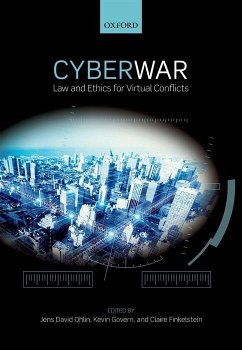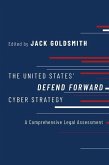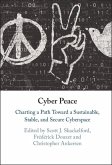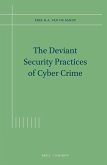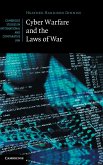Cyber War
Law and Ethics for Virtual Conflicts
Herausgeber: Ohlin, Jens David; Finkelstein, Claire; Govern, Kevin
Cyber War
Law and Ethics for Virtual Conflicts
Herausgeber: Ohlin, Jens David; Finkelstein, Claire; Govern, Kevin
- Gebundenes Buch
- Merkliste
- Auf die Merkliste
- Bewerten Bewerten
- Teilen
- Produkt teilen
- Produkterinnerung
- Produkterinnerung
Cyber warfare has become more pervasive and more complex in recent years. It is difficult to regulate, as it holds an ambiguous position within the laws of war. This book investigates the legal and ethical ramifications of cyber war, considering which sets of laws apply to it, and how it fits into traditional ideas of armed conflict.
Andere Kunden interessierten sich auch für
![Rethinking Cyber Warfare Rethinking Cyber Warfare]() R David EdelmanRethinking Cyber Warfare56,99 €
R David EdelmanRethinking Cyber Warfare56,99 €![Cyber Crime, Security and Digital Intelligence Cyber Crime, Security and Digital Intelligence]() Mark JohnsonCyber Crime, Security and Digital Intelligence211,99 €
Mark JohnsonCyber Crime, Security and Digital Intelligence211,99 €![The United States Defend Forward Cyber Strategy: A Comprehensive Legal Assessment The United States Defend Forward Cyber Strategy: A Comprehensive Legal Assessment]() GoldsmithThe United States Defend Forward Cyber Strategy: A Comprehensive Legal Assessment110,99 €
GoldsmithThe United States Defend Forward Cyber Strategy: A Comprehensive Legal Assessment110,99 €![Cyber Peace Cyber Peace]() Cyber Peace102,99 €
Cyber Peace102,99 €![The Deviant Security Practices of Cyber Crime The Deviant Security Practices of Cyber Crime]() Erik H. a. van de SandtThe Deviant Security Practices of Cyber Crime221,99 €
Erik H. a. van de SandtThe Deviant Security Practices of Cyber Crime221,99 €![Cyber Warfare and the Laws of War Cyber Warfare and the Laws of War]() Heather Harrison DinnissCyber Warfare and the Laws of War115,99 €
Heather Harrison DinnissCyber Warfare and the Laws of War115,99 €![Between Crime and War Between Crime and War]() Between Crime and War122,99 €
Between Crime and War122,99 €-
-
-
Cyber warfare has become more pervasive and more complex in recent years. It is difficult to regulate, as it holds an ambiguous position within the laws of war. This book investigates the legal and ethical ramifications of cyber war, considering which sets of laws apply to it, and how it fits into traditional ideas of armed conflict.
Produktdetails
- Produktdetails
- Verlag: Oxford University Press, USA
- Seitenzahl: 320
- Erscheinungstermin: 19. Mai 2015
- Englisch
- Abmessung: 251mm x 173mm x 16mm
- Gewicht: 762g
- ISBN-13: 9780198717492
- ISBN-10: 0198717490
- Artikelnr.: 47868453
- Verlag: Oxford University Press, USA
- Seitenzahl: 320
- Erscheinungstermin: 19. Mai 2015
- Englisch
- Abmessung: 251mm x 173mm x 16mm
- Gewicht: 762g
- ISBN-13: 9780198717492
- ISBN-10: 0198717490
- Artikelnr.: 47868453
Jens Ohlin's research and teaching interests are focused on criminal law theory, public international law, and international criminal law. He is the author, with George Fletcher, of Defending Humanity: When Force is Justified and Why (Oxford University Press, 2008), which offers a new account of international self-defence through a comparative analysis of the rules of self-defence in criminal law. His scholarly work has appeared in top law reviews and journals, including the Columbia Law Review, Cornell Law Review, Harvard International Law Journal, American Journal of International Law, and several OUP edited volumes. His current research focuses on the normative application of criminal law concepts in international criminal law, especially with regard to genocide, torture, joint criminal enterprise and co-perpetration, as well as the philosophical foundations of collective criminal action. Kevin Govern is Associate Professor of Law at the Ave Maria School of Law. Professor Govern began his legal career as an Army Judge Advocate, serving 20 years at every echelon during peacetime and war in worldwide assignments involving every legal discipline. He has also served as an Assistant Professor of Law at the United States Military Academy and has taught at California University of Pennsylvania. He has published widely and spoken frequently on international and comparative law, national security and homeland security law, military operations, and professional ethics. Claire Finkelstein is the Algernon Biddle Professor of Law and Professor of Philosophy at the University of Pennsylvania, and a co-Director of the University of Pennsylvania Institute of Law and Philosophy. She writes in the areas of criminal law theory, moral and political philosophy, philosophy of law, international law, and rational choice theory. A particular focus of her work is bringing philosophical rational choice theory to bear on legal theory, and she is particularly interested in tracing the implications of Hobbes' political theory for substantive legal questions. Recently she has also been writing on the moral and legal aspects of government-sponsored torture as part of the U.S. national security program. In 2008 Finkelstein was a Siemens Fellow at the American Academy in Berlin, during which time she presented papers in Berlin, Leipzig, and Heidelberg.
* Part I: Foundational Questions of Cyberwar
* 1: Larry May: The Nature of War and the Idea of "Cyberwar"
* 2: James L. Cook: Is There Anything Morally Special about Cyberwar?
* 3: Jens David Ohlin Part II: Conceptualizing Cyber Attacks: The
Civil-Military Divide: Cyber Causation
* 4: Stuart Macdonald: Cyberterrorism and Enemy Criminal Law
* 5: Laurie R. Blank: Cyberwar versus Cyber Attack: The Role of
Rhetoric in the Application of Law to Activities in Cyberspace
* 6: Nicolò Bussolati: The Rise of Non-State Actors in Cyberwarfare
* Part III: Cybersecurity and International Humanitarian Law: The
Ethics of Hacking and Spying
* 7: Duncan B. Hollis: Re-Thinking the Boundaries of Law in Cyberspace:
A Duty to Hack?
* 8: Christopher S. Yoo: Cyber Espionage or Cyberwar?: International
Law, Domestic Law, and Self-Protective Measures
* 9: William H. Boothby: Deception in the Modern, Cyber Battlespace
* Part IV: Responsibility and Attribution in Cyber Attacks
* 10: Marco Roscini: Evidentiary Issues in International Disputes
Related to State Responsibility for Cyber Operations
* 11: Sean Watts: Low-Intensity Cyber Operations and the Principle of
Non-Intervention
* 1: Larry May: The Nature of War and the Idea of "Cyberwar"
* 2: James L. Cook: Is There Anything Morally Special about Cyberwar?
* 3: Jens David Ohlin Part II: Conceptualizing Cyber Attacks: The
Civil-Military Divide: Cyber Causation
* 4: Stuart Macdonald: Cyberterrorism and Enemy Criminal Law
* 5: Laurie R. Blank: Cyberwar versus Cyber Attack: The Role of
Rhetoric in the Application of Law to Activities in Cyberspace
* 6: Nicolò Bussolati: The Rise of Non-State Actors in Cyberwarfare
* Part III: Cybersecurity and International Humanitarian Law: The
Ethics of Hacking and Spying
* 7: Duncan B. Hollis: Re-Thinking the Boundaries of Law in Cyberspace:
A Duty to Hack?
* 8: Christopher S. Yoo: Cyber Espionage or Cyberwar?: International
Law, Domestic Law, and Self-Protective Measures
* 9: William H. Boothby: Deception in the Modern, Cyber Battlespace
* Part IV: Responsibility and Attribution in Cyber Attacks
* 10: Marco Roscini: Evidentiary Issues in International Disputes
Related to State Responsibility for Cyber Operations
* 11: Sean Watts: Low-Intensity Cyber Operations and the Principle of
Non-Intervention
* Part I: Foundational Questions of Cyberwar
* 1: Larry May: The Nature of War and the Idea of "Cyberwar"
* 2: James L. Cook: Is There Anything Morally Special about Cyberwar?
* 3: Jens David Ohlin Part II: Conceptualizing Cyber Attacks: The
Civil-Military Divide: Cyber Causation
* 4: Stuart Macdonald: Cyberterrorism and Enemy Criminal Law
* 5: Laurie R. Blank: Cyberwar versus Cyber Attack: The Role of
Rhetoric in the Application of Law to Activities in Cyberspace
* 6: Nicolò Bussolati: The Rise of Non-State Actors in Cyberwarfare
* Part III: Cybersecurity and International Humanitarian Law: The
Ethics of Hacking and Spying
* 7: Duncan B. Hollis: Re-Thinking the Boundaries of Law in Cyberspace:
A Duty to Hack?
* 8: Christopher S. Yoo: Cyber Espionage or Cyberwar?: International
Law, Domestic Law, and Self-Protective Measures
* 9: William H. Boothby: Deception in the Modern, Cyber Battlespace
* Part IV: Responsibility and Attribution in Cyber Attacks
* 10: Marco Roscini: Evidentiary Issues in International Disputes
Related to State Responsibility for Cyber Operations
* 11: Sean Watts: Low-Intensity Cyber Operations and the Principle of
Non-Intervention
* 1: Larry May: The Nature of War and the Idea of "Cyberwar"
* 2: James L. Cook: Is There Anything Morally Special about Cyberwar?
* 3: Jens David Ohlin Part II: Conceptualizing Cyber Attacks: The
Civil-Military Divide: Cyber Causation
* 4: Stuart Macdonald: Cyberterrorism and Enemy Criminal Law
* 5: Laurie R. Blank: Cyberwar versus Cyber Attack: The Role of
Rhetoric in the Application of Law to Activities in Cyberspace
* 6: Nicolò Bussolati: The Rise of Non-State Actors in Cyberwarfare
* Part III: Cybersecurity and International Humanitarian Law: The
Ethics of Hacking and Spying
* 7: Duncan B. Hollis: Re-Thinking the Boundaries of Law in Cyberspace:
A Duty to Hack?
* 8: Christopher S. Yoo: Cyber Espionage or Cyberwar?: International
Law, Domestic Law, and Self-Protective Measures
* 9: William H. Boothby: Deception in the Modern, Cyber Battlespace
* Part IV: Responsibility and Attribution in Cyber Attacks
* 10: Marco Roscini: Evidentiary Issues in International Disputes
Related to State Responsibility for Cyber Operations
* 11: Sean Watts: Low-Intensity Cyber Operations and the Principle of
Non-Intervention

